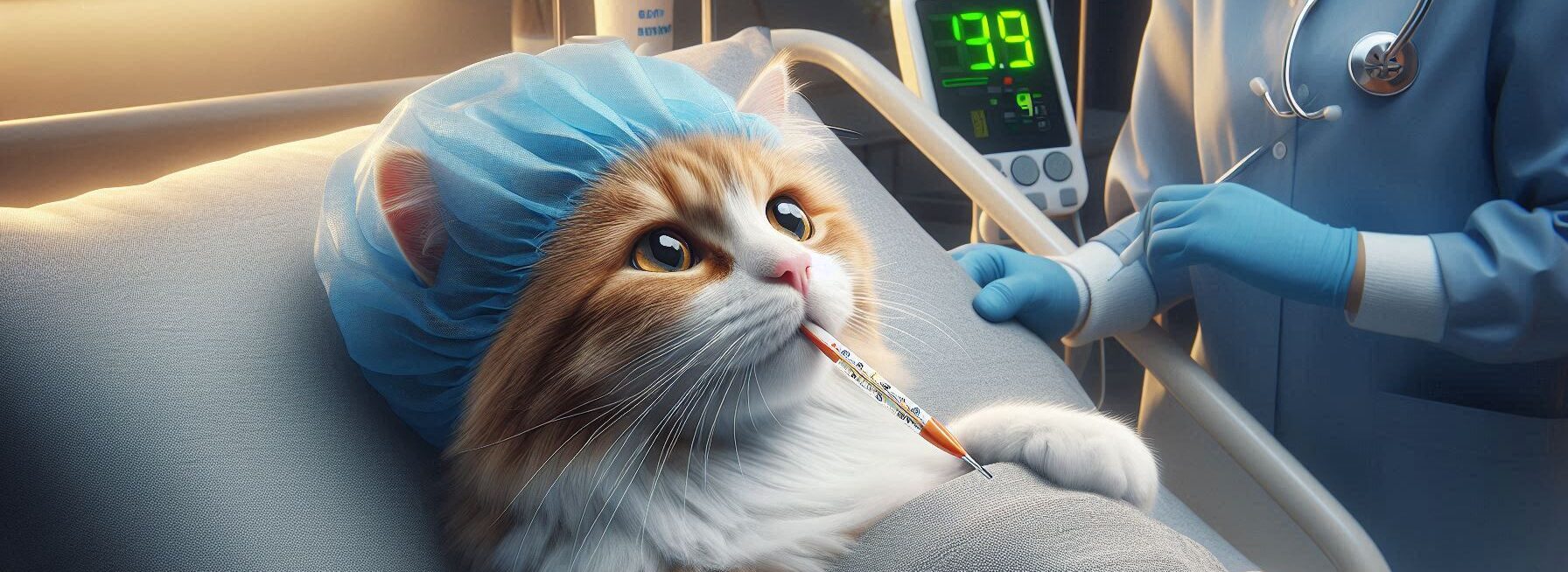As a loving cat parent, there's nothing like the thrill of seeing your furry buddy run about the home, chase phantom mice, and sleep in the sun.
But just like we need to check our personal health from time to time (and maybe even schedule that yearly physical), our cats need to be watched over in the same way.
By the way, being able to identify signs of sickness early can make a huge difference in keeping your cat healthy and happy. Let's get started on how to become a cat detective!
Top Takeaways and Key Concepts
- Observe your cat daily to understand normal behavior and detect changes early.
- Track appetite, weight, and litter box habits to monitor physical health.
- Note behavioral changes like hiding, aggression, or over-grooming as warning signs.
- Provide a consistent routine and safe spaces to reduce anxiety and stress.
- Schedule regular vet visits and vaccinations for preventative care and early detection.
Article Summary
The article emphasizes the importance of closely monitoring a cat’s health and behavior. Understanding what is normal for your cat allows you to notice subtle changes in appetite, weight, litter box use, and activity levels, which may indicate illness or stress. Behavioral signs like hiding, aggression, or excessive grooming signal potential health or emotional issues. Maintaining routines, providing safe spaces, and using calming methods help reduce stress. Regular veterinary checkups and vaccinations are critical for preventative care, early problem detection, and ensuring a long, healthy life for your feline companion.
Video Summary
Please Note: This post may contain affiliate links. If you click one of them, we may receive a commission at no extra cost to you. As an Amazon Associate, I earn from qualifying purchases.
Jump to Content
Figuring Out What Normal Behavior Is
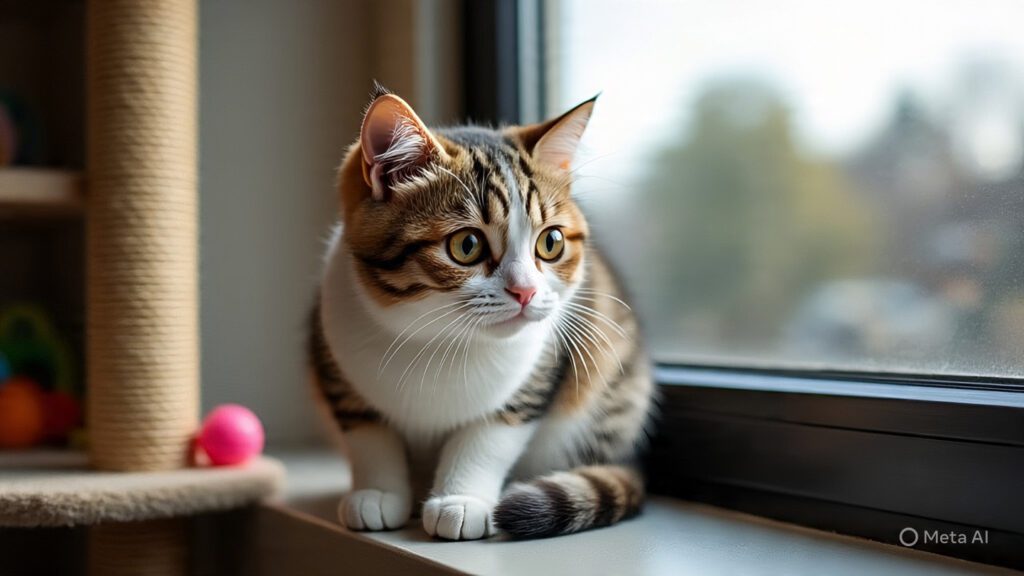
You need to know what “normal” behavior looks like in order to notice any changes in your cat's behavior.
Honestly, every cat has its own weird habits. For example, they might tilt their heads when they hear a can opener or insist on sitting on your keyboard while you write. I all, who doesn't appreciate having a cute little fluffball get in the way of their work?
Let's see: regular feeding, using the litter box, and lively activity that makes us laugh are all normal behaviors.
If your cat suddenly doesn't want to play with their favorite toy as much or seems more withdrawn than usual, these could be signs that they need your attention. Cats are very good at hiding their pain and emotional misery, so you might not notice it until things become worse. Dogs are more likely to show their sentiments through loud noises and actions, whereas cats are more subtle in how they communicate. This makes it important for cat owners to pay close attention to their pets' behavior.
If you see that your cat's behavior or habits have changed, you might ask how long it takes for these changes to be obvious. The answer is to watch the same thing over and over again. Changes that seem small today could turn into bigger problems tomorrow. For example, if your child starts to play less or hide more, it could be an indication of stress, illness, or pain. You can see problems before they get worse by paying attention to these small changes in behavior.
To keep an eye on your cat's health, think about making a schedule that lets you spend time with them every day. Not only does this connection build your link, but it also lets you see any small changes in their mood or activity levels. Spend time with them playing with their favorite toys or just sitting with them and watching how they act. Be very aware of how kids act during these times. Do they appear eager to join in, or do they seem uninterested?
Also, pay attention to other signs of health and happiness than what games they like to play. Keep an eye on how much they eat. If they suddenly lose their appetite or change how they use the litter box, such going less often or having a different consistency, these could be signs of deeper problems that need to be looked at.
Keeping a journal of what you've seen throughout time is another useful method. Keeping track of any changes in behavior can help you spot patterns that may be linked to certain events (such new people moving in or changes in routine) or health problems that may need to be looked at by a vet.
Handy Amazon Shopping Directory for Cat Supplies
Cat Food - Cat Toys - Cat Health - Grooming - Carriers - Cat Beds - Apparel
Furniture - Cat Doors - Collars - Feeding/Watering - Flea/Tick Control - Treats
If your cat keeps acting differently even after you try to play with and console them, it could be a good idea to see a vet. They can help you figure out what might be wrong with your pet and suggest the best ways to help them.
To sum up, paying attention to your cat is the most important thing you can do to understand what they require and keep them healthy. If you notice even the smallest changes in your pet's behavior and keep the lines of communication open by gently engaging with them, you'll make them feel safe enough to express themselves. This will lead to a happier and healthier life together!
Things to Look Out for in Their Body
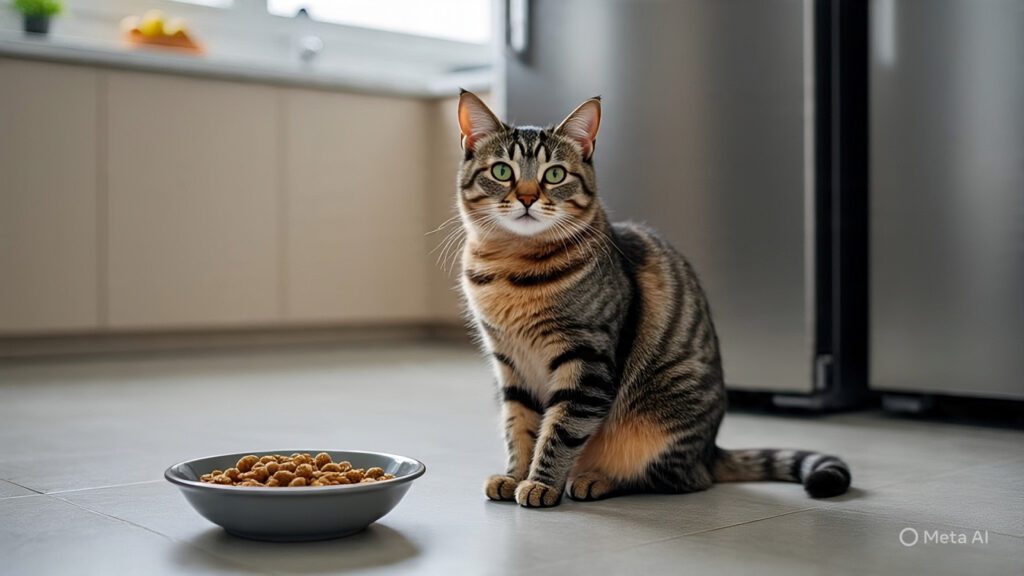
Now let's speak about some physical signs that could mean something is wrong behind all that fur. First, changes in appetite.
Has Mr. Whiskers stopped eating his kibble like it's the last meal he'll ever have and started smelling it in disgust? If you suddenly lose your appetite, it could mean a lot of things, from tooth difficulties to stomach problems.
The next thing on our agenda is changing weight. If your cat is losing weight quicker than you can say “catnip,” you might want to take them to the clinic.
On the other side, if your cat suddenly gains weight, it could be a sign of a health problem like diabetes or thyroid difficulties. It could be tempting to give your cat extra snacks or table scraps, but you need to keep a close eye on how many calories they eat overall. Those snacks that appear harmless can add up rapidly, which can lead to extra pounds that could be bad for their health and quality of life. Weighing your cat on a regular basis and keeping track of any big changes in weight will help you find these problems early.
In addition to keeping an eye on Fluffy's diet, you should also keep an eye on how often she goes to the bathroom. These are important signs of her health. If she stops using her litter box completely or seems to be struggling when using it, you should pay attention to these warning signals. This kind of behavior could mean that your pet has a urinary tract infection (UTI) or is constipated, both of which need to be seen by a vet right once. If you don't treat a UTI, it might cause uncomfortable urinating and even worse problems. Constipation can also make your cat feel bad and hurt.
To learn more about your cat's health through her litter box habits, pay attention to how often and how well she poops. Your cat's poop should be regular, firm, and moist. If you notice any big changes, including diarrhea or stools that are excessively hard, you should talk to your vet.
Making the bathroom a comfortable place to be is also vital for getting your cat to use the litter box. Make sure the litter box is clean and put it in a quiet place where Fluffy will feel protected. Some cats like certain kinds of litter or boxes with different depths. Trying out these things can sometimes help with avoidance habits.
If you see any worrying patterns in your pet's weight increase or litter box use, don't be afraid to call your vet for help. To make sure Fluffy stays healthy and happy, they might suggest changes to her nutrition, her way of life, or medical tests. By taking care of her nutrition and potty habits ahead of time, you will greatly improve her health and length of life.
In the end, it's important to know the small details about your cat's behavior, like how much she weighs and where she likes to go to the bathroom, to keep her healthy. You can give Fluffy the finest care possible by watching her closely and stepping in when necessary. This will help you build a caring bond that meets her needs at every stage of life.
Changes in Behavior That Are Cause for Concern
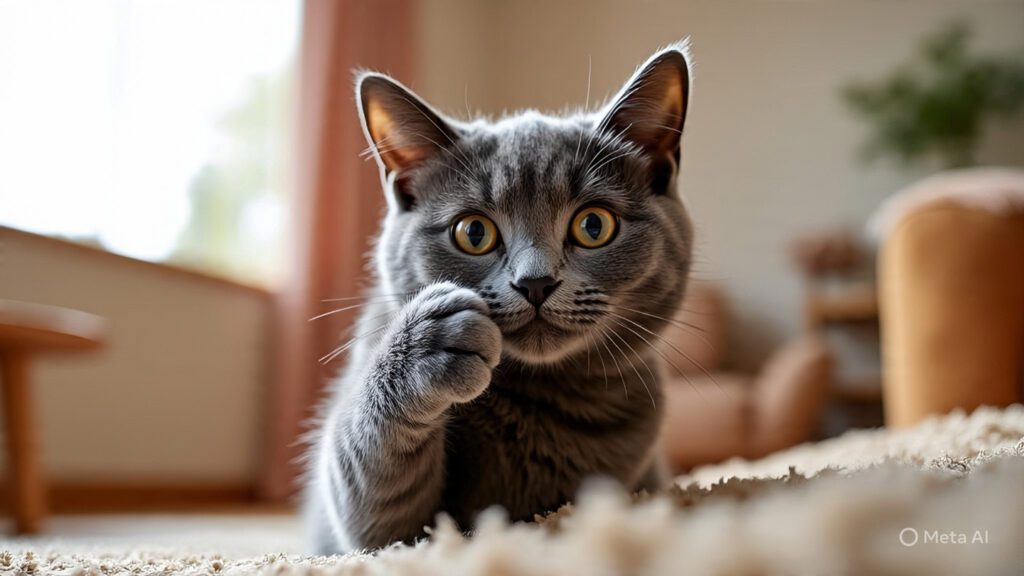
Changes in behavior or mood should not be overlooked because they may be signs of more serious health issues. Every cat owner has had their lap-warmers go missing and act strange, which makes you wonder what happened.
There are various ways to tell whether your cat is in trouble. For example, if she hides or scratches when you pick her up, she may be trying to tell you something.
Also, a rise in hostility is probably a sign of pain or stress caused by a medical problem.
When watching your cat, you should pay attention to two main patterns: how their surroundings changes and how their social life evolves. These things can have a big effect on how your cat performs in different settings. For example, if someone new moves in with you or if you change the way your home looks by moving furniture around or getting additional pets, these changes can make your cat feel anxious and unsure.
A lot of people get anxious when things change, and it can show up in different ways. Some cats may act aggressively or intensely to deal with their pain, while others may become completely apathetic, withdrawing and losing interest in their environment. This duality shows how complicated cats' emotions are; like us, cats have varied ways of dealing with stress.
If you see that your cat is grooming herself too much and her skin is getting red or irritated, this could be a sign that she is anxious. For cats that are stressed, over-grooming is a way to calm down, but it can cause more serious skin problems over time. If, on the other hand, she suddenly stops using her grooming tools altogether and won't touch brushes or combs, it could mean that she is feeling stressed or nervous about something going on around her.
It's important to look for any physical indications that may go along with these changes, in addition to observing behavior. If you don't take care of skin irritations from too much licking right once, they could get worse or even lead to infections. So, it's important to keep an eye on both your cat's behavior and their physical condition to figure out what's wrong with them.
If you think that anxiety is a problem because of changes in the environment or social dynamics in the home, you might want to try some tactics to help her relax. When she's feeling overwhelmed, having a quiet room with familiar bedding and toys to go to can help her feel better during times of change. Also, sticking to a regular schedule might help her day-to-day life become more predictable, which can ease some of her worry.
You might also look into calming products made for pets that are worried, including pheromone diffusers or pills that are made just for cats to help them relax. Playing with her in a calm way or giving her interactive toys will help her channel her worried energy into positive activities and strengthen your bond.
In the end, knowing these behavioral patterns that happen when the environment changes and your cat is anxious will give you the authority as an owner to take steps to keep your cat healthy. If you take care of both Fluffy's emotional needs and any potential health problems at the same time, you'll create a safe space for her to thrive even when things change.
Why It's Important to Take Your Pet to The Vet Regularly
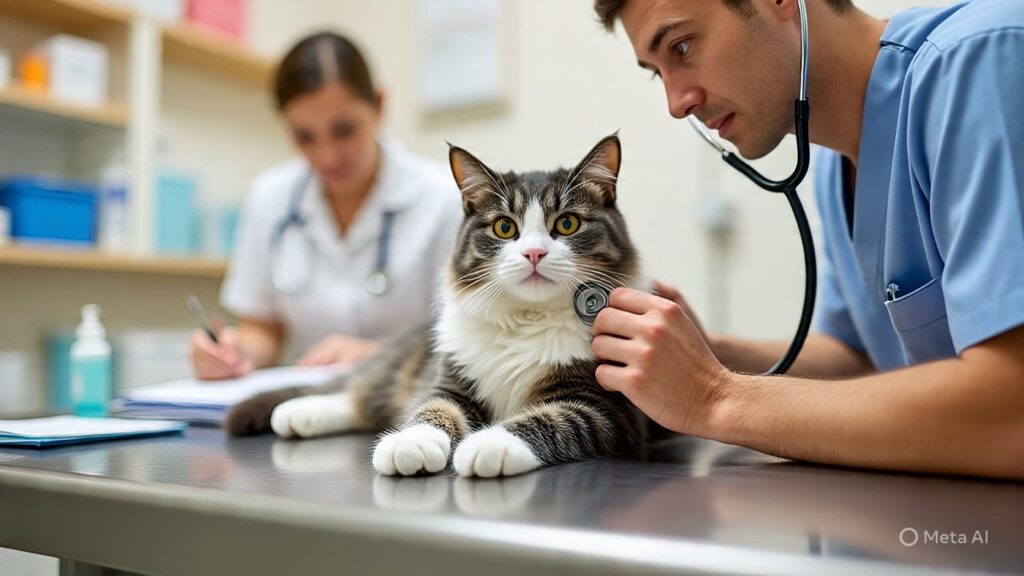
Taking into mind all the variables and causes, regular checkups can greatly improve our cat's health.
It's like telling someone that there are times when going to the doctor is really bad. Regular bird meetings are needed to avoid the horrific worst case scenario beak break. In other words, scheduling a date for Fluffy is really crucial.
During these regular visits, vets look at each cat's unique lifestyle and history and adjust their immunization plan to fit. This individualized method makes sure that each cat gets the necessary immunizations at the right times, taking into account their age, environment, and overall health to address specific health risks. It's vital to know that immunizations are more than just shots; they are very critical for keeping your pet healthy by stopping a number of diseases that might kill them.
Vaccines work by getting the cat's immune system to find and kill germs before they can make the cat sick. Vaccines protect against common but dangerous diseases like feline leukemia virus (FeLV), feline immunodeficiency virus (FIV), rabies, and panleukopenia. If you get these diseases, they can cause major health problems or even death. You can greatly lower your cat's risk of getting these severe diseases by making sure they get the vaccines that your vet recommends.
When you think about preventing sickness this way, it shows how important it is to take care of yourself ahead of time. We greatly lower the chances of needing surgery or medical care later on when we focus on keeping our pets healthy with immunizations and regular vet appointments. When pets are sick, they typically need complicated treatments and long recuperation times, which can be hard on both the pet and the owner.
This notion is similar to how detectives solve crimes: they look at all the details and gather evidence before coming to a conclusion or taking action. Also, regular examinations and immunizations for your cat might help you find problems early on. You can keep your pet healthy by using preventative care methods, just like a detective uses clues to stop crimes from happening again.
Also, keeping an eye on your cat's health includes noticing any changes in behavior or physical condition between vet visits. If you observe anything strange, including a change in your pet's eating, energy level, or litter box behaviors, you should tell your vet right away. These findings could give us important information about health problems that may need more examination.
In short, regular visits to the doctor are very important for keeping your cat healthy since they get immunizations that are made just for them. By putting preventative care first now, you're not only keeping them safe from diseases that could hurt them, but you're also making sure that their future is healthier and that they won't have as many medical problems. So keep in mind that being proactive with your pet's health care is just as important as detectives paying attention to every detail in their cases. This will help them live a long and happy life!
In short, always remember! It's simpler to tell what's not normal when you know what's usual. Keeping this in mind, along with the physical changes, activity, and aggression or lack of it, makes it a good time to take your pet to the vet.
If you're with your younger sister and you see that they're happy one minute and sad the next. So, what does that mean? Kitten should be careful what they say next!
Suggested Resources:
Understanding Feline Health
https://www.avma.org/resources-tools/pet-owners/petcare/understanding-feline-health
Signs Your Cat Is Sick
https://www.petmd.com/cat/general-health/signs-your-cat-sick
Feline Nutrition
https://www.cfa.org/nutrition
Frequently Asked Questions
What are early behavior signs that my cat may be sick?
Changes like hiding more, reduced play, sudden withdrawal, or increased aggression can indicate discomfort, stress, or illness.
Why is it important to know my cat’s normal daily routines?
Knowing what is normal helps you spot subtle differences in appetite, grooming, activity level, or litter box use much sooner.
Do appetite changes mean my cat could be ill?
A sudden decrease or increase in food intake can signal dental issues, digestive concerns, metabolic disease, or pain and should be monitored.
Is weight loss or weight gain a warning sign?
Yes. Rapid weight changes may signal serious conditions such as thyroid problems, diabetes, or other internal health issues.
Why are litter box habits important when spotting illness?
Changes in frequency, straining, diarrhea, or hard stools can indicate urinary tract issues, constipation, or digestive disturbances.
Can stress or environmental change make my cat act sick?
Stress may trigger over-grooming, hiding, reduced social behavior, or anxiety-driven aggression, which can also harm physical health.
How often should I take my cat to the vet for preventative care?
Regular yearly checkups, or bi-yearly for older cats, help catch medical issues early and ensure vaccines and care are up to date.

Kevin Collier is a dedicated feline enthusiast and expert contributor at CatFAQ.com, where he shares his knowledge on cat health, training, and overall well-being. With years of experience caring for and studying cats, Kevin provides insightful tips and practical advice to help cat owners nurture and understand their pets better. His passion for enhancing the human-animal bond shines through in his articles, making them a valuable resource for anyone looking to improve their cat’s quality of life. Whether it’s training techniques or health care tips, Kevin aims to empower cat owners with the information they need to ensure their furry companions thrive.

